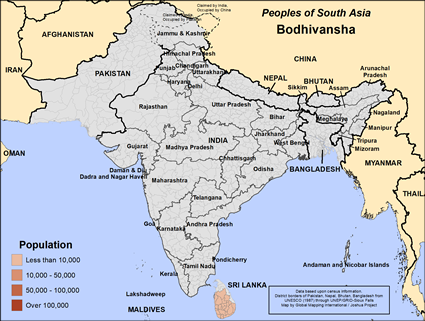Bodhivansha in Sri Lanka

Send Joshua Project a photo
of this people group. |

Map Source:
People Group data: Omid. Map geography: UNESCO / GMI. Map Design: Joshua Project
|
| People Name: | Bodhivansha |
| Country: | Sri Lanka |
| 10/40 Window: | Yes |
| Population: | 16,000 |
| World Population: | 16,000 |
| Primary Language: | Sinhala |
| Primary Religion: | Buddhism |
| Christian Adherents: | 6.02 % |
| Evangelicals: | 0.00 % |
| Scripture: | Complete Bible |
| Ministry Resources: | Yes |
| Jesus Film: | Yes |
| Audio Recordings: | Yes |
| People Cluster: | South Asia Buddhist |
| Affinity Bloc: | South Asian Peoples |
| Progress Level: |
|
Introduction / History
The Bodhivansha community of Sri Lanka traces its identity to lineages associated with Buddhist temple service and monastic support roles. Historically, families in this group were tied to the caretaking of sacred fig trees (bodhi trees) and temple grounds, which were significant religious symbols in Sri Lankan Buddhist life. Their cultural heritage developed within Sinhala-speaking environments, and Sinhala remains their primary language in daily life, worship, and oral tradition. Over generations, their community has remained closely connected to temple-centered cultural rhythms, village life, and the preservation of traditional religious practices and stories.
What Are Their Lives Like?
Many Bodhivansha families live in rural or semi-rural villages where agriculture and small-scale farming contribute to their livelihood. They often participate in communal labor and seasonal festivals that reflect both agricultural cycles and religious calendars. Social life is shaped by extended family relationships and mutual support among households. While some members of the community have pursued education and employment in towns and cities, village identity remains strong. Respect for elders, hospitality, and maintaining harmony in interpersonal relationships are cultural values that continue to shape daily life.
What Are Their Beliefs?
The Bodhivansha identify strongly with Theravada Buddhism. Their religious practice emphasizes devotion at temples, respect for monks, participation in ritual offerings, and observance of Buddhist moral teachings. The bodhi tree, symbolizing enlightenment, is a central religious symbol for this community, and its ceremonial care has historical and cultural significance. For many, religious practice is intertwined with cultural identity, with family and community expectations reinforcing adherence to traditional beliefs. The Buddhist idea of personal salvation is understood in terms of moving toward merit and eventual release from the cycle of rebirth, often through devotion, ethical living, and temple rituals. Exposure to Christianity may be limited, and the concept of a personal relationship with a loving God is not widely understood within the community. There is, however, a small group of Christians among them.
What Are Their Needs?
Economic challenges affect some Bodhivansha families, especially in rural areas where employment options are limited. Access to healthcare and educational opportunities can vary, especially for those living far from major towns. Social changes and the pressures of modernization sometimes create tension for younger people who desire broader horizons while still feeling obligated to honor family traditions.
Spiritually, gaining the opportunity to hear the message of Jesus in ways that are respectful, relational, and understandable could help them explore faith beyond cultural expectations. For those who do come to follow Christ, supportive discipleship communities are essential so that new believers do not feel isolated or misunderstood.
Prayer Points
Pray that Bodhivansha households would experience stable and sustainable livelihoods, especially those who depend on uncertain agricultural income.
Ask God to open pathways for education and community development that affirm dignity and provide hope for younger generations.
Pray that the gospel would be communicated among them through relationships characterized by patience, gentleness, and genuine love.
Intercede for workers who are called to live among them, learn their language and rhythms, and share Christ in ways that honor their cultural identity.
Pray that those who come to faith in Jesus would grow in courage, wisdom, and joy, and that they might eventually become part of the global discipleship force.